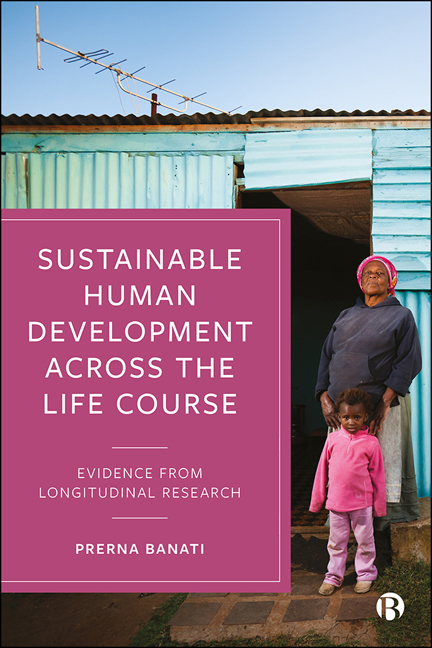Book contents
- Frontmatter
- Dedication
- Dedication
- Contents
- List of Figures, Tables and Boxes
- Notes on Contributors
- Foreword: Understanding and Enhancing Human Development Among Global Youth – On the Unique Value of Developmentally Oriented Longitudinal Research
- Introduction: Measuring Sustainable Human Development Across the Life Course
- 1 Exploring the Potential for Gender Norm Change in Adolescent Girls: Evidence from ‘Real Choices, Real Lives’ Longitudinal, Qualitative Study Data
- 2 Unequal Educational Trajectories: The Case of Ethiopia
- 3 Early Life Transitions Increase the Risk for HIV Infection: Using Latent Class Growth Models to Assess the Effect of Key Life Events on HIV Incidence Among Adolescent Girls in Rural South Africa
- 4 Achieving the Sustainable Development Goals: Evidence from the Longitudinal Parenting Across Cultures Project
- 5 Achieving Gender Equality: Understanding Gender Equality and Health Among Vulnerable Adolescents in the Sustainable Development Goals Era
- 6 Capturing the Complexities of Adolescent Transitions Through a Mixed Methods Longitudinal Research Design
- 7 Child Well-being Across the Life Course: What Do We Know, What Should We Know?
- 8 Mauritian Joint Child Health Project: A Multigenerational Family Study Emerging from a Prospective Birth Cohort Study: Initial Alcohol-related Outcomes in the Offspring Generation
- Conclusion: The Future of Longitudinal Research
- Index
4 - Achieving the Sustainable Development Goals: Evidence from the Longitudinal Parenting Across Cultures Project
Published online by Cambridge University Press: 05 January 2022
- Frontmatter
- Dedication
- Dedication
- Contents
- List of Figures, Tables and Boxes
- Notes on Contributors
- Foreword: Understanding and Enhancing Human Development Among Global Youth – On the Unique Value of Developmentally Oriented Longitudinal Research
- Introduction: Measuring Sustainable Human Development Across the Life Course
- 1 Exploring the Potential for Gender Norm Change in Adolescent Girls: Evidence from ‘Real Choices, Real Lives’ Longitudinal, Qualitative Study Data
- 2 Unequal Educational Trajectories: The Case of Ethiopia
- 3 Early Life Transitions Increase the Risk for HIV Infection: Using Latent Class Growth Models to Assess the Effect of Key Life Events on HIV Incidence Among Adolescent Girls in Rural South Africa
- 4 Achieving the Sustainable Development Goals: Evidence from the Longitudinal Parenting Across Cultures Project
- 5 Achieving Gender Equality: Understanding Gender Equality and Health Among Vulnerable Adolescents in the Sustainable Development Goals Era
- 6 Capturing the Complexities of Adolescent Transitions Through a Mixed Methods Longitudinal Research Design
- 7 Child Well-being Across the Life Course: What Do We Know, What Should We Know?
- 8 Mauritian Joint Child Health Project: A Multigenerational Family Study Emerging from a Prospective Birth Cohort Study: Initial Alcohol-related Outcomes in the Offspring Generation
- Conclusion: The Future of Longitudinal Research
- Index
Summary
Introduction
This chapter uses evidence from the Parenting across Cultures (PAC) project to illustrate ways in which longitudinal data can help achieve the Sustainable Development Goals (SDGs; https://sustainabledevelopment.un.org/). The chapter begins by providing an overview of the research questions that have guided PAC as well as a description of the participants, procedures and measures. Next, empirical findings from PAC are summarized to illustrate implications for six specific SDGs. Then the chapter describes how longitudinal data offer advantages over cross-sectional data in operationalizing SDG targets and implementing the SDGs. Finally, limitations, future research directions and conclusions are provided.
PAC was developed in response to concerns that understanding of parenting and child development was biased by the predominant focus in the literature on studying families in Western, educated, industrialized, rich and democratic (WEIRD) societies and that findings in such countries may not generalize well to more diverse populations around the world (Henrich et al, 2010). In an analysis of the sample characteristics in the most influential journals in six subdisciplines of psychology from 2003 to 2007, 96% of research participants were from Western industrialized countries, and 68% were from the United States alone (Arnett, 2008), which means that 96% of research participants in these psychological studies were from countries with only 12% of the world's population (Henrich et al, 2010). When basic science research is limited to WEIRD countries, knowledge of human development becomes defined by a set of experiences that may not be widely shared in different cultural contexts, so studying parenting and child development in a wide range of diverse cultural contexts is important to understand development more fully.
PAC has been conceptualized and funded as a consecutive series of three five-year grants, each covering a different developmental period and guided by different research questions. In the first project period, participants were aged 8 to 12. The main research questions focused on cultural differences in links between discipline and child adjustment, warmth as a moderator of links between harsh discipline and child outcomes, and cognitive and emotional mediators of effects of harsh discipline on children's aggression and anxiety. In the second period, target participants were 13 to 17 years old.
- Type
- Chapter
- Information
- Sustainable Human Development across the Life CourseEvidence from Longitudinal Research, pp. 89 - 112Publisher: Bristol University PressPrint publication year: 2021

